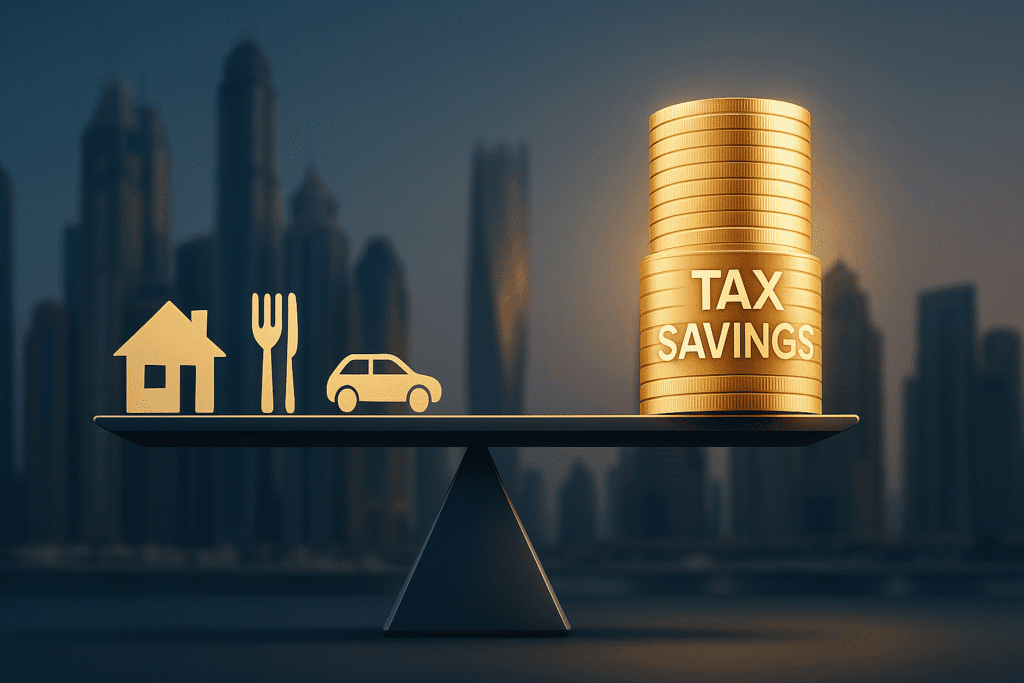
The Cost of Living in Dubai: A Realistic View for 2025
Is it expensive to live in Dubai? It’s the most common question, and the answer is: it depends on your lifestyle. Dubai can be as luxurious or as affordable as you choose. In this guide, we break down the real costs to give you a clear view, but remember the most important factor: with 0% income tax, your purchasing power soars.
Monthly Budget Breakdown
Distribution of a Typical Expat Budget 📊
While every case is unique, most resident budgets in Dubai follow a similar distribution, with housing as the largest expense.
The Power of 0% Income Tax: A Case Study
To understand the real impact on your finances, let’s compare the budget of a professional with a gross annual income of €100,000 in a typical European country versus Dubai.
| Item | Professional in Europe | Same Professional in Dubai |
|---|---|---|
| Gross Annual Income | €100,000 | €100,000 |
| Income Tax (approx. 35%) | – €35,000 | – €0 |
| Net Annual Income (Money in your pocket) | €65,000 | €100,000 |
| Estimated Annual Cost of Living | – €45,000 | – €55,000 |
| ANNUAL SAVING CAPACITY | €20,000 | €45,000 |
Even if the cost of living in Dubai is slightly higher in this example, the absence of income tax results in a saving capacity that is more than double. This is the real financial advantage.
Housing: The Largest Component of Your Budget 🏠
Rent is undoubtedly the biggest monthly expense. Prices vary enormously depending on the area, size, and quality of the building. Here are some estimated annual ranges:
Premium Areas
Apartments in Dubai Marina, Downtown, Palm Jumeirah.
- 1 Bedroom: 100k-150k AED
- 2 Bedrooms: 150k-250k AED
Popular Family Areas
Apartments and villas in JVC, JLT, Arabian Ranches.
- 1 Bedroom: 60k-90k AED
- 2 Bedrooms: 90k-140k AED
More Affordable Areas
Apartments in Deira, Bur Dubai, Discovery Gardens.
- 1 Bedroom: 45k-60k AED
- 2 Bedrooms: 60k-85k AED
Note: Rents are usually paid annually in 1, 2, or 4 post-dated cheques, although monthly payments are becoming more common. A 5% municipal housing fee (calculated on the annual rent) is added to these prices.
Transport and Mobility: Efficient and Affordable 🚗
Getting around Dubai is easy and relatively inexpensive. Although public transport is excellent, most expats opt for a private car for convenience.
- Private Car: Petrol is significantly cheaper than in Europe. A new or second-hand car is a very popular option.
- Metro and Tram: The Dubai Metro is modern, clean, and air-conditioned. It connects the main areas of the city at a very low cost.
- Taxis and Ride-Sharing: Services like Careem (local) and Uber are widely available and more affordable than in many other major cities.
Food and Groceries: A World of Options 🛒
Your food expenses can vary greatly. Dubai offers everything from hypermarkets with very competitive prices to gourmet shops with imported products.
A couple can spend between AED 2,000 and 4,000 per month on groceries, depending on their habits. Chains like Carrefour, Lulu, or Union Coop are known for their affordable prices, while Spinneys and Waitrose offer a wider selection of international products at a higher price.
Education and Healthcare: Investing in Your Well-being 🎓
For families, these are two of the most significant costs. The quality is exceptional, but the services are predominantly private.
International Schools
Annual fees range from AED 20,000 in Indian curriculum schools to over AED 100,000 in the most prestigious British or American schools.
See schools guide →Private Medical Insurance
It is mandatory by law for all residents. A good annual plan for an individual can cost between AED 5,000 and 15,000, depending on coverage.
Understand the health system →Leisure, Utilities, and Other Monthly Expenses 💳
Beyond the major pillars, your monthly budget will include household utilities and, of course, lifestyle and entertainment expenses.
Utilities
Basic household bills are a recurring cost to consider. They include:
- DEWA: 500-1,500 AED/month (Elec. & Water)
- Internet/TV: 400-600 AED/month
- Mobile Plan: 200-400 AED/month
Leisure & Entertainment
This is where your lifestyle makes a difference. Some reference prices:
- Dinner for two: 300-600 AED (Mid-range Rest.)
- Cinema Ticket: 45-60 AED
- Gym (month): 300-700 AED
Personal Expenses
This category includes shopping, personal care, and other extras. It’s highly variable, but it’s wise to budget:
- An extra AED 1,500-3,000 per person per month to cover these expenses comfortably.
Frequently Asked Questions about Cost of Living
How much money do I need to live comfortably in Dubai?
It’s subjective, but a good benchmark for a single person living a comfortable lifestyle (without extravagant luxuries) would be a monthly budget of AED 12,000-15,000. For a family of four, this range could increase to AED 25,000-40,000, mainly due to housing and education costs.
Is Dubai more expensive than cities like London, New York, or Madrid?
In general, rent and education are comparable or sometimes more expensive. However, transport, petrol, utilities, and many consumer goods are cheaper. The big difference is that with no income tax, your net disposable income is much higher, which often more than compensates for the higher costs in certain areas.
